Analysis of Depression in Young Adults (18-25) in the UK: Report
VerifiedAdded on 2022/11/29
|30
|12135
|1
Report
AI Summary
This report investigates the multifaceted issue of depression among young adults aged 18-25 in the UK. It delves into the root causes of depression, including factors like abuse, genetics, and existing mental health issues. The report explores the various impacts of depression on the mental and physical well-being of this demographic, and outlines the different stages of depression, from mild to severe. Furthermore, it examines a range of management strategies, encompassing exercise, yoga, medication, and therapy. The study also highlights the crucial role of support services, such as family, friends, and teachers, in aiding young adults struggling with depression. The report finds that abuse is a significant trigger for depression within this age group, and it identifies parents and GPs as common sources of social support. The report is structured to provide a clear understanding of the topic, from background information and literature review to research methodology, discussion, and conclusion, offering a comprehensive analysis of depression in this vulnerable population.
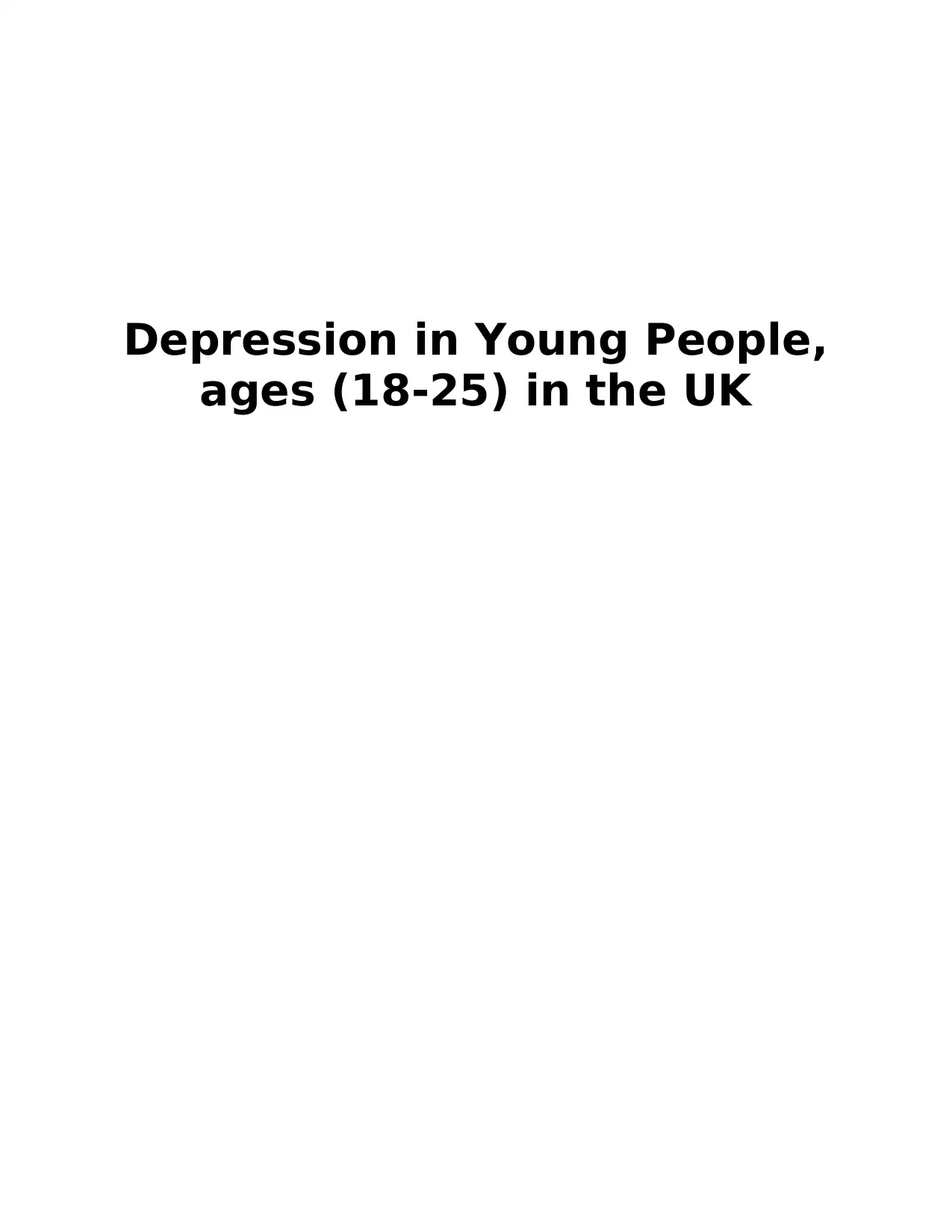
Depression in Young People,
ages (18-25) in the UK
ages (18-25) in the UK
Paraphrase This Document
Need a fresh take? Get an instant paraphrase of this document with our AI Paraphraser
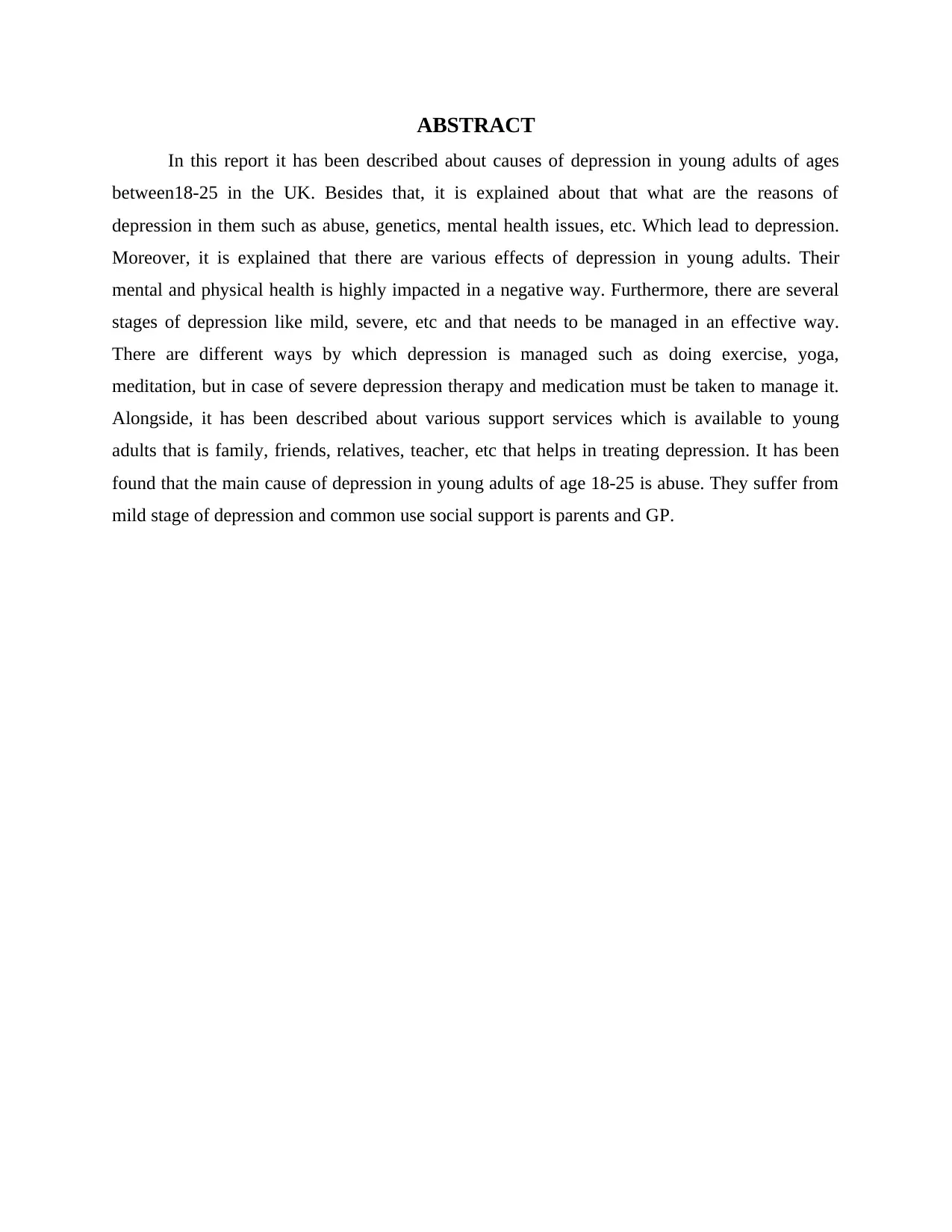
ABSTRACT
In this report it has been described about causes of depression in young adults of ages
between18-25 in the UK. Besides that, it is explained about that what are the reasons of
depression in them such as abuse, genetics, mental health issues, etc. Which lead to depression.
Moreover, it is explained that there are various effects of depression in young adults. Their
mental and physical health is highly impacted in a negative way. Furthermore, there are several
stages of depression like mild, severe, etc and that needs to be managed in an effective way.
There are different ways by which depression is managed such as doing exercise, yoga,
meditation, but in case of severe depression therapy and medication must be taken to manage it.
Alongside, it has been described about various support services which is available to young
adults that is family, friends, relatives, teacher, etc that helps in treating depression. It has been
found that the main cause of depression in young adults of age 18-25 is abuse. They suffer from
mild stage of depression and common use social support is parents and GP.
In this report it has been described about causes of depression in young adults of ages
between18-25 in the UK. Besides that, it is explained about that what are the reasons of
depression in them such as abuse, genetics, mental health issues, etc. Which lead to depression.
Moreover, it is explained that there are various effects of depression in young adults. Their
mental and physical health is highly impacted in a negative way. Furthermore, there are several
stages of depression like mild, severe, etc and that needs to be managed in an effective way.
There are different ways by which depression is managed such as doing exercise, yoga,
meditation, but in case of severe depression therapy and medication must be taken to manage it.
Alongside, it has been described about various support services which is available to young
adults that is family, friends, relatives, teacher, etc that helps in treating depression. It has been
found that the main cause of depression in young adults of age 18-25 is abuse. They suffer from
mild stage of depression and common use social support is parents and GP.
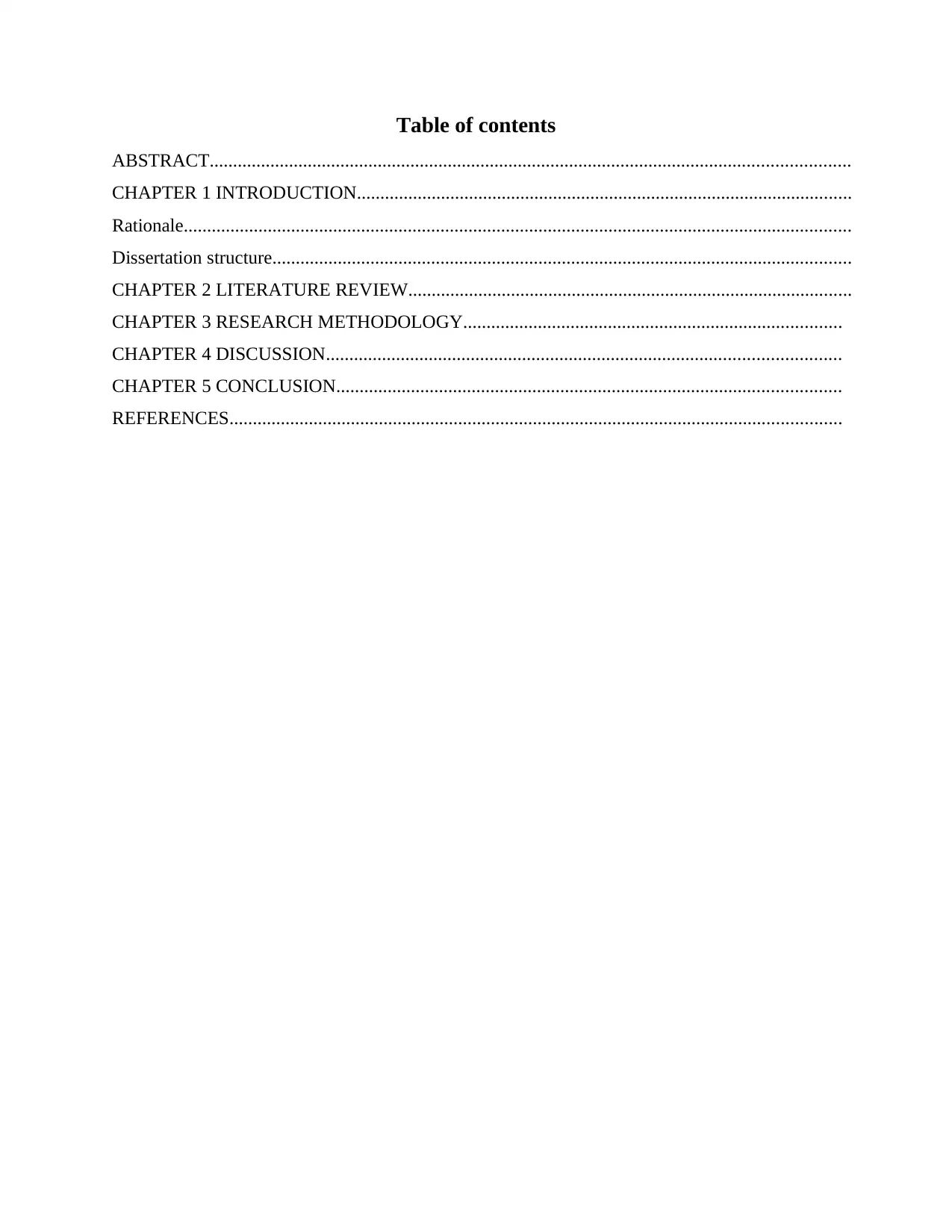
Table of contents
ABSTRACT.........................................................................................................................................
CHAPTER 1 INTRODUCTION..........................................................................................................
Rationale...............................................................................................................................................
Dissertation structure............................................................................................................................
CHAPTER 2 LITERATURE REVIEW...............................................................................................
CHAPTER 3 RESEARCH METHODOLOGY.................................................................................
CHAPTER 4 DISCUSSION..............................................................................................................
CHAPTER 5 CONCLUSION............................................................................................................
REFERENCES...................................................................................................................................
ABSTRACT.........................................................................................................................................
CHAPTER 1 INTRODUCTION..........................................................................................................
Rationale...............................................................................................................................................
Dissertation structure............................................................................................................................
CHAPTER 2 LITERATURE REVIEW...............................................................................................
CHAPTER 3 RESEARCH METHODOLOGY.................................................................................
CHAPTER 4 DISCUSSION..............................................................................................................
CHAPTER 5 CONCLUSION............................................................................................................
REFERENCES...................................................................................................................................
⊘ This is a preview!⊘
Do you want full access?
Subscribe today to unlock all pages.

Trusted by 1+ million students worldwide
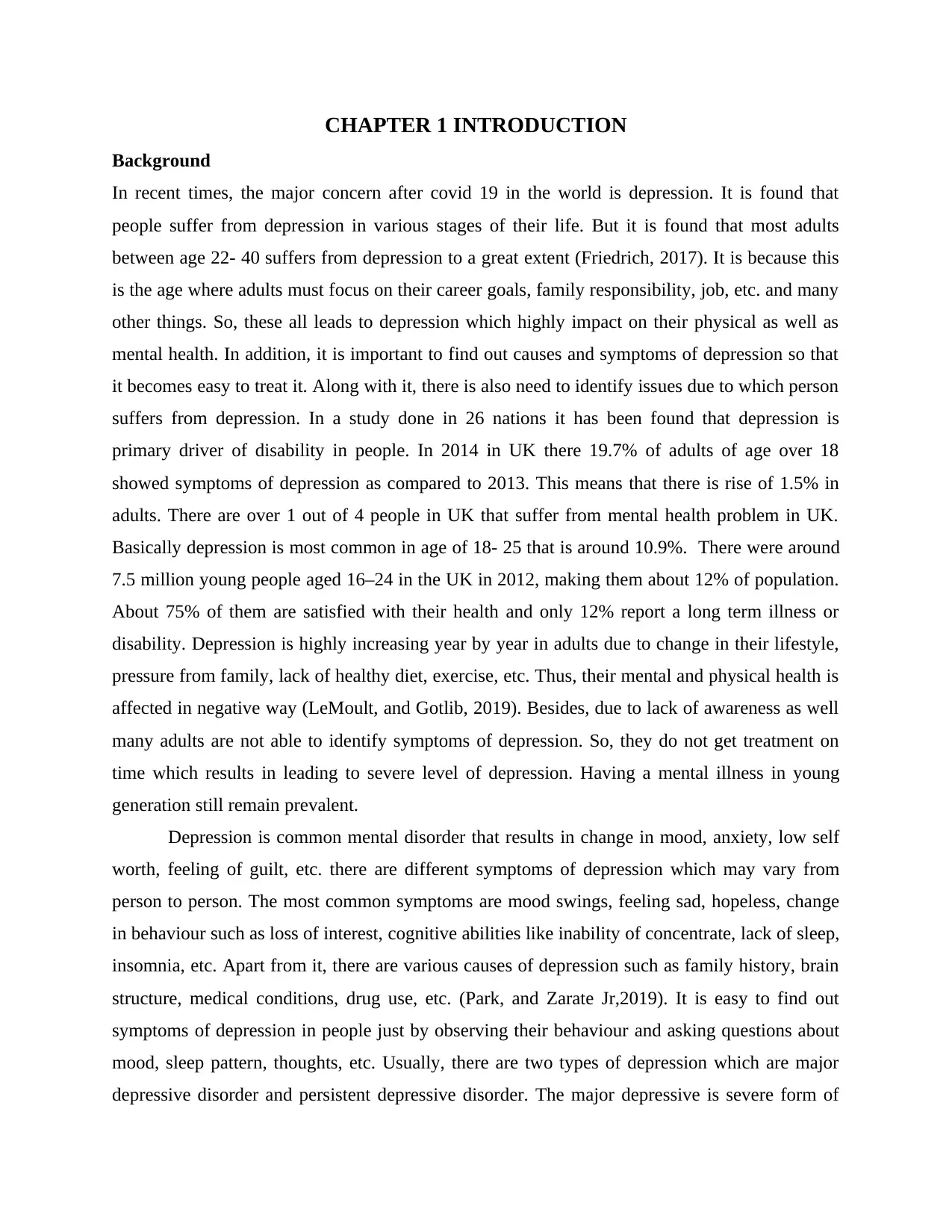
CHAPTER 1 INTRODUCTION
Background
In recent times, the major concern after covid 19 in the world is depression. It is found that
people suffer from depression in various stages of their life. But it is found that most adults
between age 22- 40 suffers from depression to a great extent (Friedrich, 2017). It is because this
is the age where adults must focus on their career goals, family responsibility, job, etc. and many
other things. So, these all leads to depression which highly impact on their physical as well as
mental health. In addition, it is important to find out causes and symptoms of depression so that
it becomes easy to treat it. Along with it, there is also need to identify issues due to which person
suffers from depression. In a study done in 26 nations it has been found that depression is
primary driver of disability in people. In 2014 in UK there 19.7% of adults of age over 18
showed symptoms of depression as compared to 2013. This means that there is rise of 1.5% in
adults. There are over 1 out of 4 people in UK that suffer from mental health problem in UK.
Basically depression is most common in age of 18- 25 that is around 10.9%. There were around
7.5 million young people aged 16–24 in the UK in 2012, making them about 12% of population.
About 75% of them are satisfied with their health and only 12% report a long term illness or
disability. Depression is highly increasing year by year in adults due to change in their lifestyle,
pressure from family, lack of healthy diet, exercise, etc. Thus, their mental and physical health is
affected in negative way (LeMoult, and Gotlib, 2019). Besides, due to lack of awareness as well
many adults are not able to identify symptoms of depression. So, they do not get treatment on
time which results in leading to severe level of depression. Having a mental illness in young
generation still remain prevalent.
Depression is common mental disorder that results in change in mood, anxiety, low self
worth, feeling of guilt, etc. there are different symptoms of depression which may vary from
person to person. The most common symptoms are mood swings, feeling sad, hopeless, change
in behaviour such as loss of interest, cognitive abilities like inability of concentrate, lack of sleep,
insomnia, etc. Apart from it, there are various causes of depression such as family history, brain
structure, medical conditions, drug use, etc. (Park, and Zarate Jr,2019). It is easy to find out
symptoms of depression in people just by observing their behaviour and asking questions about
mood, sleep pattern, thoughts, etc. Usually, there are two types of depression which are major
depressive disorder and persistent depressive disorder. The major depressive is severe form of
Background
In recent times, the major concern after covid 19 in the world is depression. It is found that
people suffer from depression in various stages of their life. But it is found that most adults
between age 22- 40 suffers from depression to a great extent (Friedrich, 2017). It is because this
is the age where adults must focus on their career goals, family responsibility, job, etc. and many
other things. So, these all leads to depression which highly impact on their physical as well as
mental health. In addition, it is important to find out causes and symptoms of depression so that
it becomes easy to treat it. Along with it, there is also need to identify issues due to which person
suffers from depression. In a study done in 26 nations it has been found that depression is
primary driver of disability in people. In 2014 in UK there 19.7% of adults of age over 18
showed symptoms of depression as compared to 2013. This means that there is rise of 1.5% in
adults. There are over 1 out of 4 people in UK that suffer from mental health problem in UK.
Basically depression is most common in age of 18- 25 that is around 10.9%. There were around
7.5 million young people aged 16–24 in the UK in 2012, making them about 12% of population.
About 75% of them are satisfied with their health and only 12% report a long term illness or
disability. Depression is highly increasing year by year in adults due to change in their lifestyle,
pressure from family, lack of healthy diet, exercise, etc. Thus, their mental and physical health is
affected in negative way (LeMoult, and Gotlib, 2019). Besides, due to lack of awareness as well
many adults are not able to identify symptoms of depression. So, they do not get treatment on
time which results in leading to severe level of depression. Having a mental illness in young
generation still remain prevalent.
Depression is common mental disorder that results in change in mood, anxiety, low self
worth, feeling of guilt, etc. there are different symptoms of depression which may vary from
person to person. The most common symptoms are mood swings, feeling sad, hopeless, change
in behaviour such as loss of interest, cognitive abilities like inability of concentrate, lack of sleep,
insomnia, etc. Apart from it, there are various causes of depression such as family history, brain
structure, medical conditions, drug use, etc. (Park, and Zarate Jr,2019). It is easy to find out
symptoms of depression in people just by observing their behaviour and asking questions about
mood, sleep pattern, thoughts, etc. Usually, there are two types of depression which are major
depressive disorder and persistent depressive disorder. The major depressive is severe form of
Paraphrase This Document
Need a fresh take? Get an instant paraphrase of this document with our AI Paraphraser
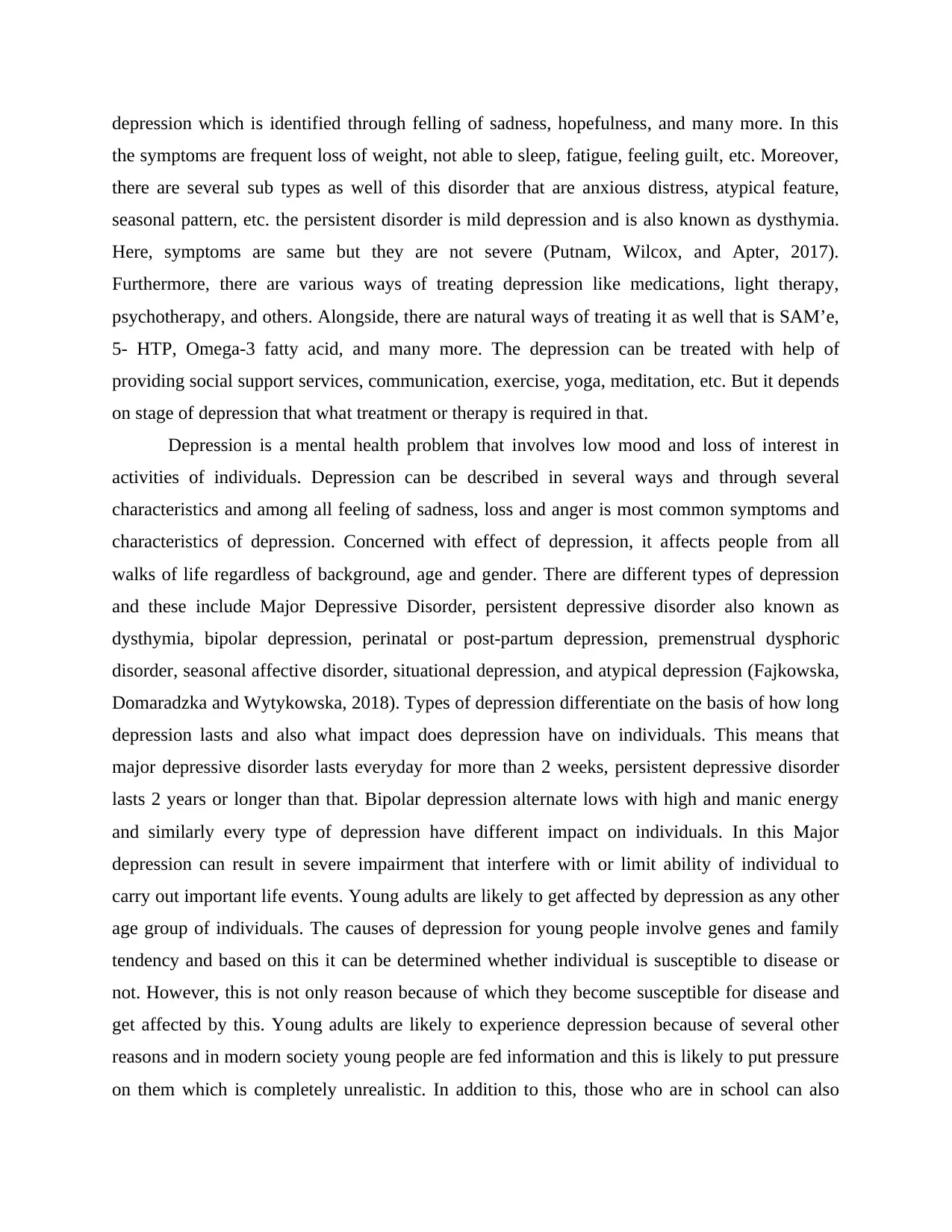
depression which is identified through felling of sadness, hopefulness, and many more. In this
the symptoms are frequent loss of weight, not able to sleep, fatigue, feeling guilt, etc. Moreover,
there are several sub types as well of this disorder that are anxious distress, atypical feature,
seasonal pattern, etc. the persistent disorder is mild depression and is also known as dysthymia.
Here, symptoms are same but they are not severe (Putnam, Wilcox, and Apter, 2017).
Furthermore, there are various ways of treating depression like medications, light therapy,
psychotherapy, and others. Alongside, there are natural ways of treating it as well that is SAM’e,
5- HTP, Omega-3 fatty acid, and many more. The depression can be treated with help of
providing social support services, communication, exercise, yoga, meditation, etc. But it depends
on stage of depression that what treatment or therapy is required in that.
Depression is a mental health problem that involves low mood and loss of interest in
activities of individuals. Depression can be described in several ways and through several
characteristics and among all feeling of sadness, loss and anger is most common symptoms and
characteristics of depression. Concerned with effect of depression, it affects people from all
walks of life regardless of background, age and gender. There are different types of depression
and these include Major Depressive Disorder, persistent depressive disorder also known as
dysthymia, bipolar depression, perinatal or post-partum depression, premenstrual dysphoric
disorder, seasonal affective disorder, situational depression, and atypical depression (Fajkowska,
Domaradzka and Wytykowska, 2018). Types of depression differentiate on the basis of how long
depression lasts and also what impact does depression have on individuals. This means that
major depressive disorder lasts everyday for more than 2 weeks, persistent depressive disorder
lasts 2 years or longer than that. Bipolar depression alternate lows with high and manic energy
and similarly every type of depression have different impact on individuals. In this Major
depression can result in severe impairment that interfere with or limit ability of individual to
carry out important life events. Young adults are likely to get affected by depression as any other
age group of individuals. The causes of depression for young people involve genes and family
tendency and based on this it can be determined whether individual is susceptible to disease or
not. However, this is not only reason because of which they become susceptible for disease and
get affected by this. Young adults are likely to experience depression because of several other
reasons and in modern society young people are fed information and this is likely to put pressure
on them which is completely unrealistic. In addition to this, those who are in school can also
the symptoms are frequent loss of weight, not able to sleep, fatigue, feeling guilt, etc. Moreover,
there are several sub types as well of this disorder that are anxious distress, atypical feature,
seasonal pattern, etc. the persistent disorder is mild depression and is also known as dysthymia.
Here, symptoms are same but they are not severe (Putnam, Wilcox, and Apter, 2017).
Furthermore, there are various ways of treating depression like medications, light therapy,
psychotherapy, and others. Alongside, there are natural ways of treating it as well that is SAM’e,
5- HTP, Omega-3 fatty acid, and many more. The depression can be treated with help of
providing social support services, communication, exercise, yoga, meditation, etc. But it depends
on stage of depression that what treatment or therapy is required in that.
Depression is a mental health problem that involves low mood and loss of interest in
activities of individuals. Depression can be described in several ways and through several
characteristics and among all feeling of sadness, loss and anger is most common symptoms and
characteristics of depression. Concerned with effect of depression, it affects people from all
walks of life regardless of background, age and gender. There are different types of depression
and these include Major Depressive Disorder, persistent depressive disorder also known as
dysthymia, bipolar depression, perinatal or post-partum depression, premenstrual dysphoric
disorder, seasonal affective disorder, situational depression, and atypical depression (Fajkowska,
Domaradzka and Wytykowska, 2018). Types of depression differentiate on the basis of how long
depression lasts and also what impact does depression have on individuals. This means that
major depressive disorder lasts everyday for more than 2 weeks, persistent depressive disorder
lasts 2 years or longer than that. Bipolar depression alternate lows with high and manic energy
and similarly every type of depression have different impact on individuals. In this Major
depression can result in severe impairment that interfere with or limit ability of individual to
carry out important life events. Young adults are likely to get affected by depression as any other
age group of individuals. The causes of depression for young people involve genes and family
tendency and based on this it can be determined whether individual is susceptible to disease or
not. However, this is not only reason because of which they become susceptible for disease and
get affected by this. Young adults are likely to experience depression because of several other
reasons and in modern society young people are fed information and this is likely to put pressure
on them which is completely unrealistic. In addition to this, those who are in school can also
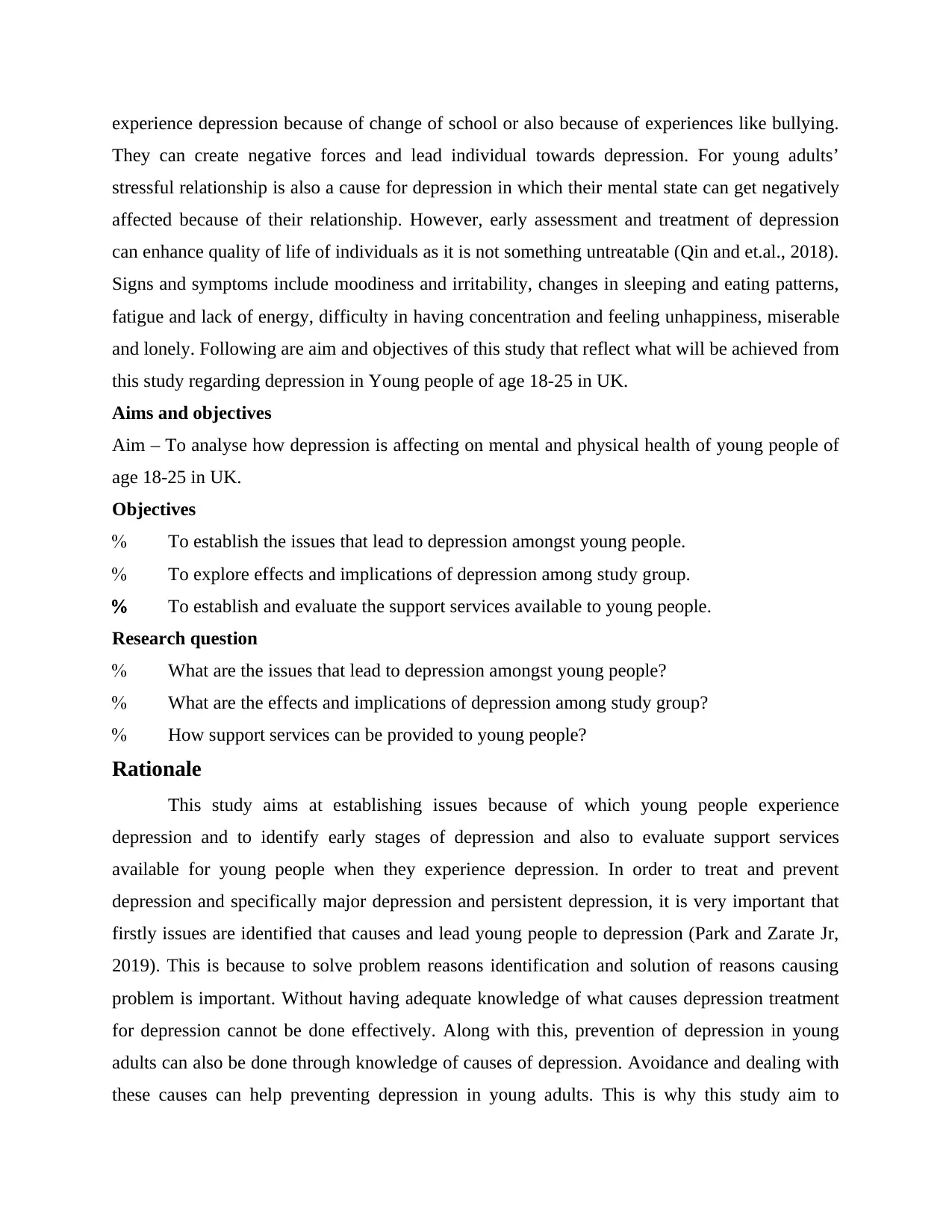
experience depression because of change of school or also because of experiences like bullying.
They can create negative forces and lead individual towards depression. For young adults’
stressful relationship is also a cause for depression in which their mental state can get negatively
affected because of their relationship. However, early assessment and treatment of depression
can enhance quality of life of individuals as it is not something untreatable (Qin and et.al., 2018).
Signs and symptoms include moodiness and irritability, changes in sleeping and eating patterns,
fatigue and lack of energy, difficulty in having concentration and feeling unhappiness, miserable
and lonely. Following are aim and objectives of this study that reflect what will be achieved from
this study regarding depression in Young people of age 18-25 in UK.
Aims and objectives
Aim – To analyse how depression is affecting on mental and physical health of young people of
age 18-25 in UK.
Objectives
% To establish the issues that lead to depression amongst young people.
% To explore effects and implications of depression among study group.
% To establish and evaluate the support services available to young people.
Research question
% What are the issues that lead to depression amongst young people?
% What are the effects and implications of depression among study group?
% How support services can be provided to young people?
Rationale
This study aims at establishing issues because of which young people experience
depression and to identify early stages of depression and also to evaluate support services
available for young people when they experience depression. In order to treat and prevent
depression and specifically major depression and persistent depression, it is very important that
firstly issues are identified that causes and lead young people to depression (Park and Zarate Jr,
2019). This is because to solve problem reasons identification and solution of reasons causing
problem is important. Without having adequate knowledge of what causes depression treatment
for depression cannot be done effectively. Along with this, prevention of depression in young
adults can also be done through knowledge of causes of depression. Avoidance and dealing with
these causes can help preventing depression in young adults. This is why this study aim to
They can create negative forces and lead individual towards depression. For young adults’
stressful relationship is also a cause for depression in which their mental state can get negatively
affected because of their relationship. However, early assessment and treatment of depression
can enhance quality of life of individuals as it is not something untreatable (Qin and et.al., 2018).
Signs and symptoms include moodiness and irritability, changes in sleeping and eating patterns,
fatigue and lack of energy, difficulty in having concentration and feeling unhappiness, miserable
and lonely. Following are aim and objectives of this study that reflect what will be achieved from
this study regarding depression in Young people of age 18-25 in UK.
Aims and objectives
Aim – To analyse how depression is affecting on mental and physical health of young people of
age 18-25 in UK.
Objectives
% To establish the issues that lead to depression amongst young people.
% To explore effects and implications of depression among study group.
% To establish and evaluate the support services available to young people.
Research question
% What are the issues that lead to depression amongst young people?
% What are the effects and implications of depression among study group?
% How support services can be provided to young people?
Rationale
This study aims at establishing issues because of which young people experience
depression and to identify early stages of depression and also to evaluate support services
available for young people when they experience depression. In order to treat and prevent
depression and specifically major depression and persistent depression, it is very important that
firstly issues are identified that causes and lead young people to depression (Park and Zarate Jr,
2019). This is because to solve problem reasons identification and solution of reasons causing
problem is important. Without having adequate knowledge of what causes depression treatment
for depression cannot be done effectively. Along with this, prevention of depression in young
adults can also be done through knowledge of causes of depression. Avoidance and dealing with
these causes can help preventing depression in young adults. This is why this study aim to
⊘ This is a preview!⊘
Do you want full access?
Subscribe today to unlock all pages.

Trusted by 1+ million students worldwide
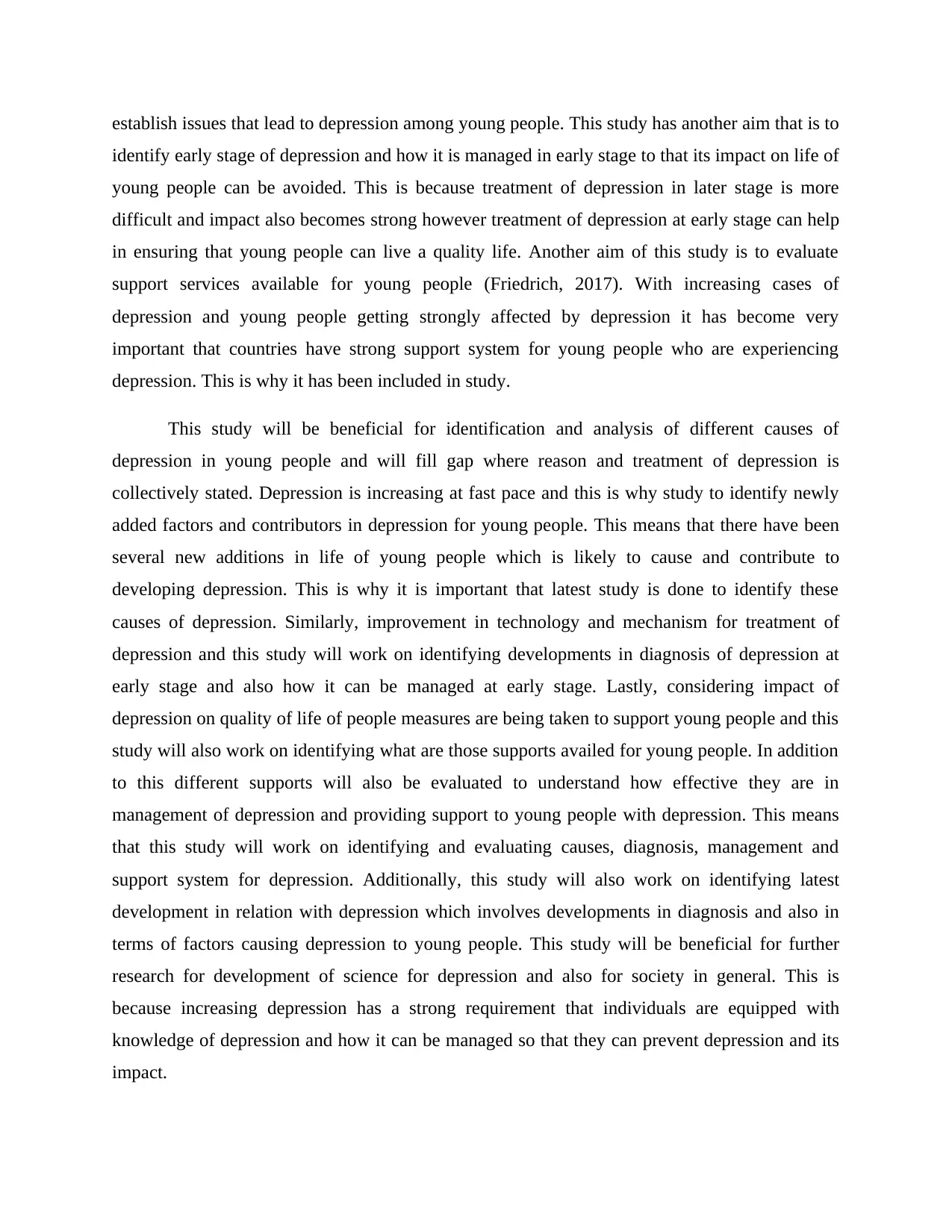
establish issues that lead to depression among young people. This study has another aim that is to
identify early stage of depression and how it is managed in early stage to that its impact on life of
young people can be avoided. This is because treatment of depression in later stage is more
difficult and impact also becomes strong however treatment of depression at early stage can help
in ensuring that young people can live a quality life. Another aim of this study is to evaluate
support services available for young people (Friedrich, 2017). With increasing cases of
depression and young people getting strongly affected by depression it has become very
important that countries have strong support system for young people who are experiencing
depression. This is why it has been included in study.
This study will be beneficial for identification and analysis of different causes of
depression in young people and will fill gap where reason and treatment of depression is
collectively stated. Depression is increasing at fast pace and this is why study to identify newly
added factors and contributors in depression for young people. This means that there have been
several new additions in life of young people which is likely to cause and contribute to
developing depression. This is why it is important that latest study is done to identify these
causes of depression. Similarly, improvement in technology and mechanism for treatment of
depression and this study will work on identifying developments in diagnosis of depression at
early stage and also how it can be managed at early stage. Lastly, considering impact of
depression on quality of life of people measures are being taken to support young people and this
study will also work on identifying what are those supports availed for young people. In addition
to this different supports will also be evaluated to understand how effective they are in
management of depression and providing support to young people with depression. This means
that this study will work on identifying and evaluating causes, diagnosis, management and
support system for depression. Additionally, this study will also work on identifying latest
development in relation with depression which involves developments in diagnosis and also in
terms of factors causing depression to young people. This study will be beneficial for further
research for development of science for depression and also for society in general. This is
because increasing depression has a strong requirement that individuals are equipped with
knowledge of depression and how it can be managed so that they can prevent depression and its
impact.
identify early stage of depression and how it is managed in early stage to that its impact on life of
young people can be avoided. This is because treatment of depression in later stage is more
difficult and impact also becomes strong however treatment of depression at early stage can help
in ensuring that young people can live a quality life. Another aim of this study is to evaluate
support services available for young people (Friedrich, 2017). With increasing cases of
depression and young people getting strongly affected by depression it has become very
important that countries have strong support system for young people who are experiencing
depression. This is why it has been included in study.
This study will be beneficial for identification and analysis of different causes of
depression in young people and will fill gap where reason and treatment of depression is
collectively stated. Depression is increasing at fast pace and this is why study to identify newly
added factors and contributors in depression for young people. This means that there have been
several new additions in life of young people which is likely to cause and contribute to
developing depression. This is why it is important that latest study is done to identify these
causes of depression. Similarly, improvement in technology and mechanism for treatment of
depression and this study will work on identifying developments in diagnosis of depression at
early stage and also how it can be managed at early stage. Lastly, considering impact of
depression on quality of life of people measures are being taken to support young people and this
study will also work on identifying what are those supports availed for young people. In addition
to this different supports will also be evaluated to understand how effective they are in
management of depression and providing support to young people with depression. This means
that this study will work on identifying and evaluating causes, diagnosis, management and
support system for depression. Additionally, this study will also work on identifying latest
development in relation with depression which involves developments in diagnosis and also in
terms of factors causing depression to young people. This study will be beneficial for further
research for development of science for depression and also for society in general. This is
because increasing depression has a strong requirement that individuals are equipped with
knowledge of depression and how it can be managed so that they can prevent depression and its
impact.
Paraphrase This Document
Need a fresh take? Get an instant paraphrase of this document with our AI Paraphraser
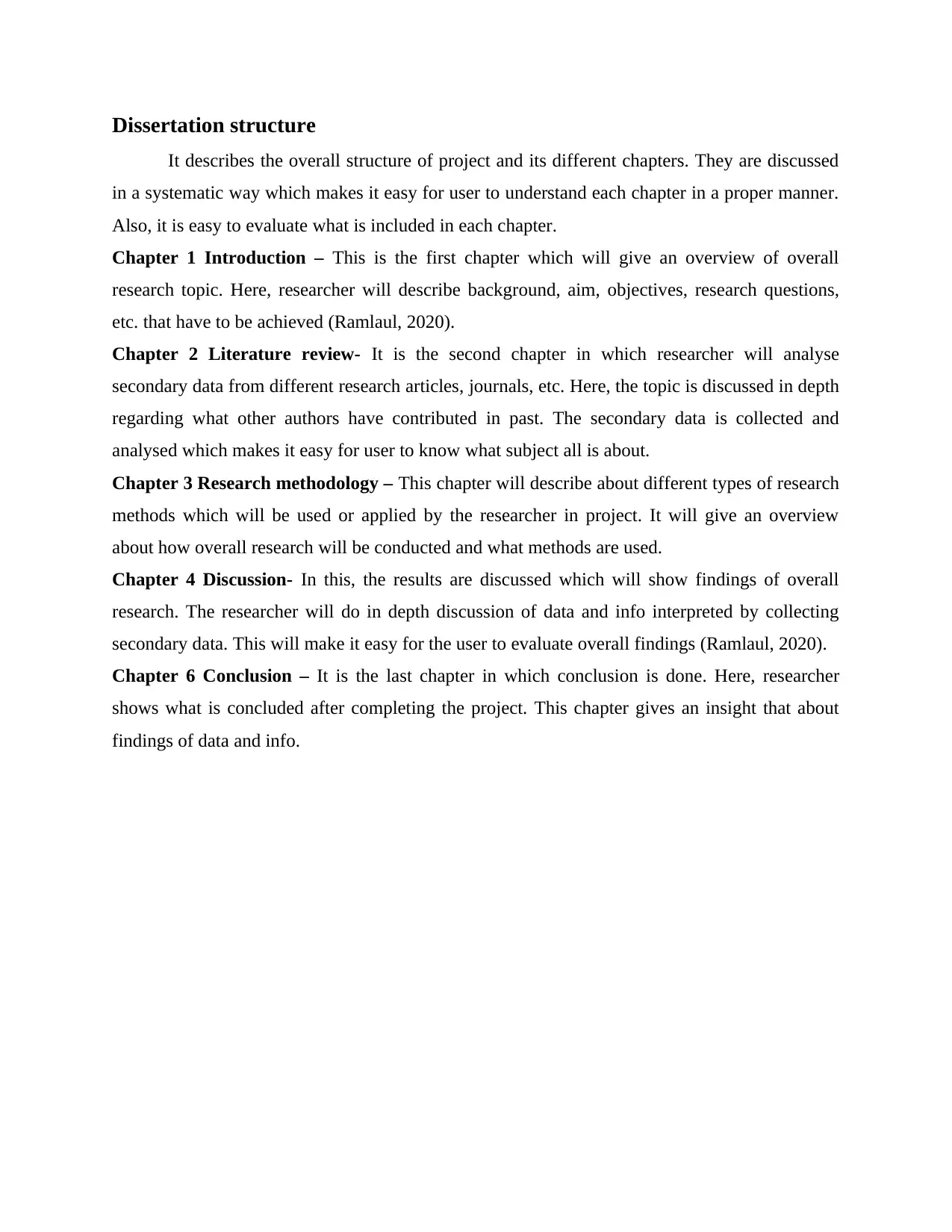
Dissertation structure
It describes the overall structure of project and its different chapters. They are discussed
in a systematic way which makes it easy for user to understand each chapter in a proper manner.
Also, it is easy to evaluate what is included in each chapter.
Chapter 1 Introduction – This is the first chapter which will give an overview of overall
research topic. Here, researcher will describe background, aim, objectives, research questions,
etc. that have to be achieved (Ramlaul, 2020).
Chapter 2 Literature review- It is the second chapter in which researcher will analyse
secondary data from different research articles, journals, etc. Here, the topic is discussed in depth
regarding what other authors have contributed in past. The secondary data is collected and
analysed which makes it easy for user to know what subject all is about.
Chapter 3 Research methodology – This chapter will describe about different types of research
methods which will be used or applied by the researcher in project. It will give an overview
about how overall research will be conducted and what methods are used.
Chapter 4 Discussion- In this, the results are discussed which will show findings of overall
research. The researcher will do in depth discussion of data and info interpreted by collecting
secondary data. This will make it easy for the user to evaluate overall findings (Ramlaul, 2020).
Chapter 6 Conclusion – It is the last chapter in which conclusion is done. Here, researcher
shows what is concluded after completing the project. This chapter gives an insight that about
findings of data and info.
It describes the overall structure of project and its different chapters. They are discussed
in a systematic way which makes it easy for user to understand each chapter in a proper manner.
Also, it is easy to evaluate what is included in each chapter.
Chapter 1 Introduction – This is the first chapter which will give an overview of overall
research topic. Here, researcher will describe background, aim, objectives, research questions,
etc. that have to be achieved (Ramlaul, 2020).
Chapter 2 Literature review- It is the second chapter in which researcher will analyse
secondary data from different research articles, journals, etc. Here, the topic is discussed in depth
regarding what other authors have contributed in past. The secondary data is collected and
analysed which makes it easy for user to know what subject all is about.
Chapter 3 Research methodology – This chapter will describe about different types of research
methods which will be used or applied by the researcher in project. It will give an overview
about how overall research will be conducted and what methods are used.
Chapter 4 Discussion- In this, the results are discussed which will show findings of overall
research. The researcher will do in depth discussion of data and info interpreted by collecting
secondary data. This will make it easy for the user to evaluate overall findings (Ramlaul, 2020).
Chapter 6 Conclusion – It is the last chapter in which conclusion is done. Here, researcher
shows what is concluded after completing the project. This chapter gives an insight that about
findings of data and info.
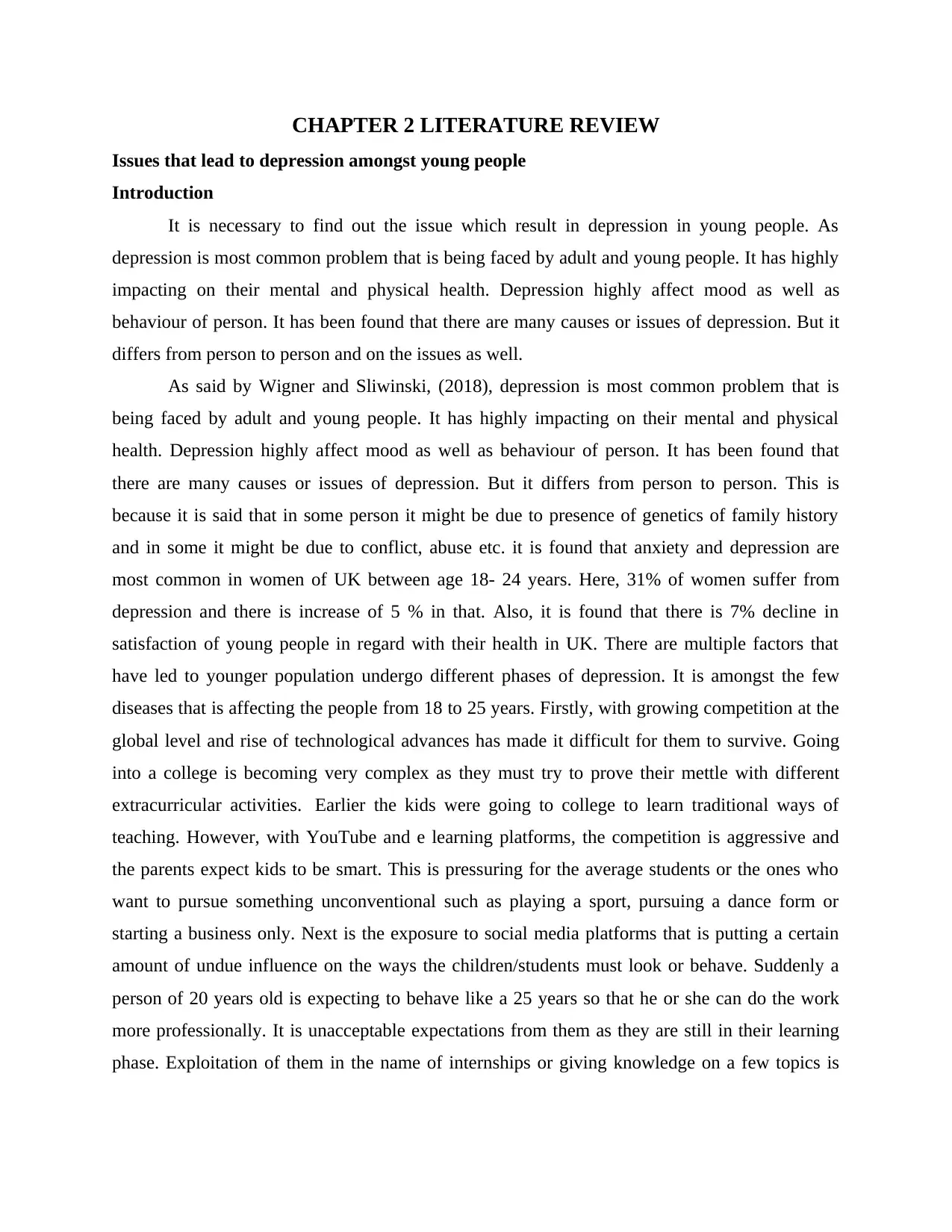
CHAPTER 2 LITERATURE REVIEW
Issues that lead to depression amongst young people
Introduction
It is necessary to find out the issue which result in depression in young people. As
depression is most common problem that is being faced by adult and young people. It has highly
impacting on their mental and physical health. Depression highly affect mood as well as
behaviour of person. It has been found that there are many causes or issues of depression. But it
differs from person to person and on the issues as well.
As said by Wigner and Sliwinski, (2018), depression is most common problem that is
being faced by adult and young people. It has highly impacting on their mental and physical
health. Depression highly affect mood as well as behaviour of person. It has been found that
there are many causes or issues of depression. But it differs from person to person. This is
because it is said that in some person it might be due to presence of genetics of family history
and in some it might be due to conflict, abuse etc. it is found that anxiety and depression are
most common in women of UK between age 18- 24 years. Here, 31% of women suffer from
depression and there is increase of 5 % in that. Also, it is found that there is 7% decline in
satisfaction of young people in regard with their health in UK. There are multiple factors that
have led to younger population undergo different phases of depression. It is amongst the few
diseases that is affecting the people from 18 to 25 years. Firstly, with growing competition at the
global level and rise of technological advances has made it difficult for them to survive. Going
into a college is becoming very complex as they must try to prove their mettle with different
extracurricular activities. Earlier the kids were going to college to learn traditional ways of
teaching. However, with YouTube and e learning platforms, the competition is aggressive and
the parents expect kids to be smart. This is pressuring for the average students or the ones who
want to pursue something unconventional such as playing a sport, pursuing a dance form or
starting a business only. Next is the exposure to social media platforms that is putting a certain
amount of undue influence on the ways the children/students must look or behave. Suddenly a
person of 20 years old is expecting to behave like a 25 years so that he or she can do the work
more professionally. It is unacceptable expectations from them as they are still in their learning
phase. Exploitation of them in the name of internships or giving knowledge on a few topics is
Issues that lead to depression amongst young people
Introduction
It is necessary to find out the issue which result in depression in young people. As
depression is most common problem that is being faced by adult and young people. It has highly
impacting on their mental and physical health. Depression highly affect mood as well as
behaviour of person. It has been found that there are many causes or issues of depression. But it
differs from person to person and on the issues as well.
As said by Wigner and Sliwinski, (2018), depression is most common problem that is
being faced by adult and young people. It has highly impacting on their mental and physical
health. Depression highly affect mood as well as behaviour of person. It has been found that
there are many causes or issues of depression. But it differs from person to person. This is
because it is said that in some person it might be due to presence of genetics of family history
and in some it might be due to conflict, abuse etc. it is found that anxiety and depression are
most common in women of UK between age 18- 24 years. Here, 31% of women suffer from
depression and there is increase of 5 % in that. Also, it is found that there is 7% decline in
satisfaction of young people in regard with their health in UK. There are multiple factors that
have led to younger population undergo different phases of depression. It is amongst the few
diseases that is affecting the people from 18 to 25 years. Firstly, with growing competition at the
global level and rise of technological advances has made it difficult for them to survive. Going
into a college is becoming very complex as they must try to prove their mettle with different
extracurricular activities. Earlier the kids were going to college to learn traditional ways of
teaching. However, with YouTube and e learning platforms, the competition is aggressive and
the parents expect kids to be smart. This is pressuring for the average students or the ones who
want to pursue something unconventional such as playing a sport, pursuing a dance form or
starting a business only. Next is the exposure to social media platforms that is putting a certain
amount of undue influence on the ways the children/students must look or behave. Suddenly a
person of 20 years old is expecting to behave like a 25 years so that he or she can do the work
more professionally. It is unacceptable expectations from them as they are still in their learning
phase. Exploitation of them in the name of internships or giving knowledge on a few topics is
⊘ This is a preview!⊘
Do you want full access?
Subscribe today to unlock all pages.

Trusted by 1+ million students worldwide
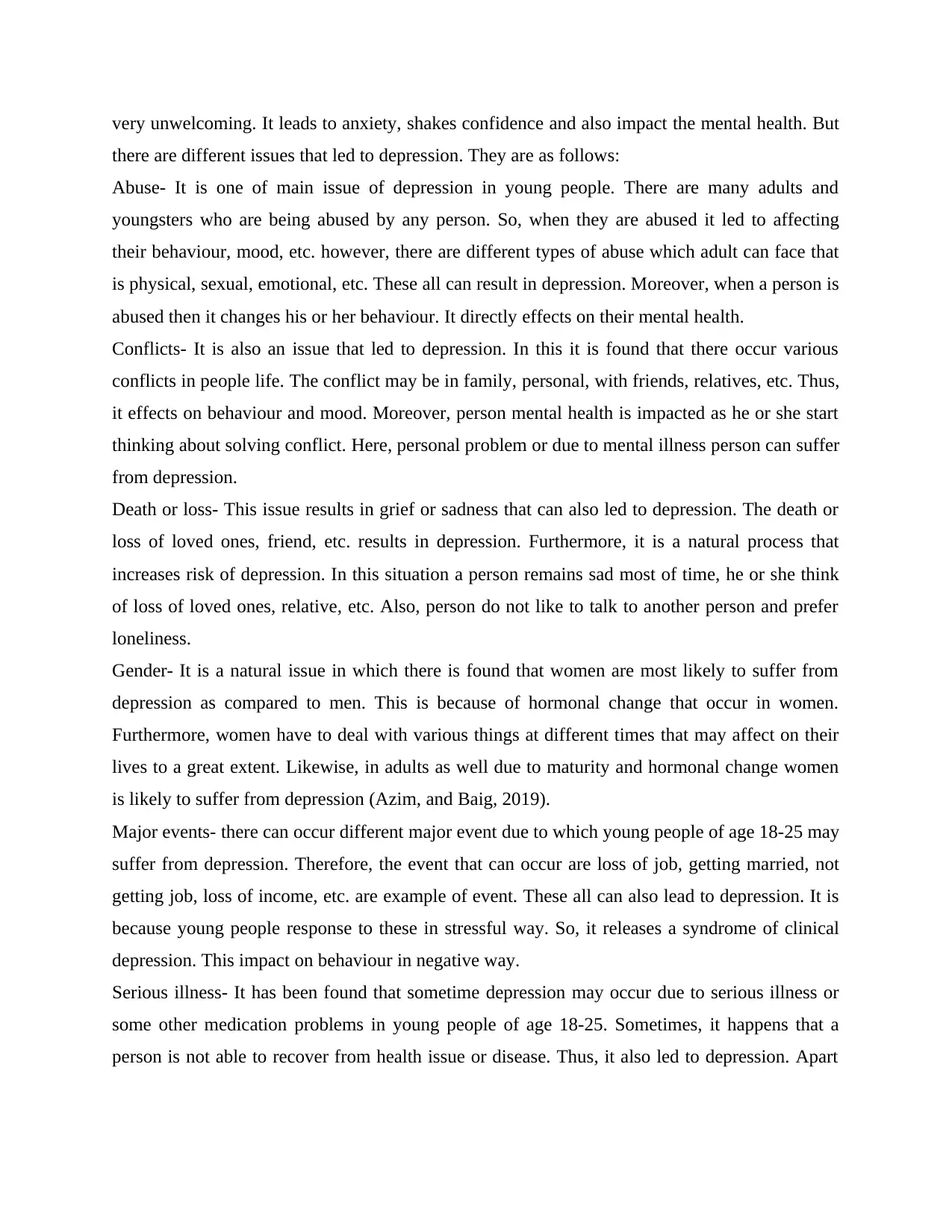
very unwelcoming. It leads to anxiety, shakes confidence and also impact the mental health. But
there are different issues that led to depression. They are as follows:
Abuse- It is one of main issue of depression in young people. There are many adults and
youngsters who are being abused by any person. So, when they are abused it led to affecting
their behaviour, mood, etc. however, there are different types of abuse which adult can face that
is physical, sexual, emotional, etc. These all can result in depression. Moreover, when a person is
abused then it changes his or her behaviour. It directly effects on their mental health.
Conflicts- It is also an issue that led to depression. In this it is found that there occur various
conflicts in people life. The conflict may be in family, personal, with friends, relatives, etc. Thus,
it effects on behaviour and mood. Moreover, person mental health is impacted as he or she start
thinking about solving conflict. Here, personal problem or due to mental illness person can suffer
from depression.
Death or loss- This issue results in grief or sadness that can also led to depression. The death or
loss of loved ones, friend, etc. results in depression. Furthermore, it is a natural process that
increases risk of depression. In this situation a person remains sad most of time, he or she think
of loss of loved ones, relative, etc. Also, person do not like to talk to another person and prefer
loneliness.
Gender- It is a natural issue in which there is found that women are most likely to suffer from
depression as compared to men. This is because of hormonal change that occur in women.
Furthermore, women have to deal with various things at different times that may affect on their
lives to a great extent. Likewise, in adults as well due to maturity and hormonal change women
is likely to suffer from depression (Azim, and Baig, 2019).
Major events- there can occur different major event due to which young people of age 18-25 may
suffer from depression. Therefore, the event that can occur are loss of job, getting married, not
getting job, loss of income, etc. are example of event. These all can also lead to depression. It is
because young people response to these in stressful way. So, it releases a syndrome of clinical
depression. This impact on behaviour in negative way.
Serious illness- It has been found that sometime depression may occur due to serious illness or
some other medication problems in young people of age 18-25. Sometimes, it happens that a
person is not able to recover from health issue or disease. Thus, it also led to depression. Apart
there are different issues that led to depression. They are as follows:
Abuse- It is one of main issue of depression in young people. There are many adults and
youngsters who are being abused by any person. So, when they are abused it led to affecting
their behaviour, mood, etc. however, there are different types of abuse which adult can face that
is physical, sexual, emotional, etc. These all can result in depression. Moreover, when a person is
abused then it changes his or her behaviour. It directly effects on their mental health.
Conflicts- It is also an issue that led to depression. In this it is found that there occur various
conflicts in people life. The conflict may be in family, personal, with friends, relatives, etc. Thus,
it effects on behaviour and mood. Moreover, person mental health is impacted as he or she start
thinking about solving conflict. Here, personal problem or due to mental illness person can suffer
from depression.
Death or loss- This issue results in grief or sadness that can also led to depression. The death or
loss of loved ones, friend, etc. results in depression. Furthermore, it is a natural process that
increases risk of depression. In this situation a person remains sad most of time, he or she think
of loss of loved ones, relative, etc. Also, person do not like to talk to another person and prefer
loneliness.
Gender- It is a natural issue in which there is found that women are most likely to suffer from
depression as compared to men. This is because of hormonal change that occur in women.
Furthermore, women have to deal with various things at different times that may affect on their
lives to a great extent. Likewise, in adults as well due to maturity and hormonal change women
is likely to suffer from depression (Azim, and Baig, 2019).
Major events- there can occur different major event due to which young people of age 18-25 may
suffer from depression. Therefore, the event that can occur are loss of job, getting married, not
getting job, loss of income, etc. are example of event. These all can also lead to depression. It is
because young people response to these in stressful way. So, it releases a syndrome of clinical
depression. This impact on behaviour in negative way.
Serious illness- It has been found that sometime depression may occur due to serious illness or
some other medication problems in young people of age 18-25. Sometimes, it happens that a
person is not able to recover from health issue or disease. Thus, it also led to depression. Apart
Paraphrase This Document
Need a fresh take? Get an instant paraphrase of this document with our AI Paraphraser
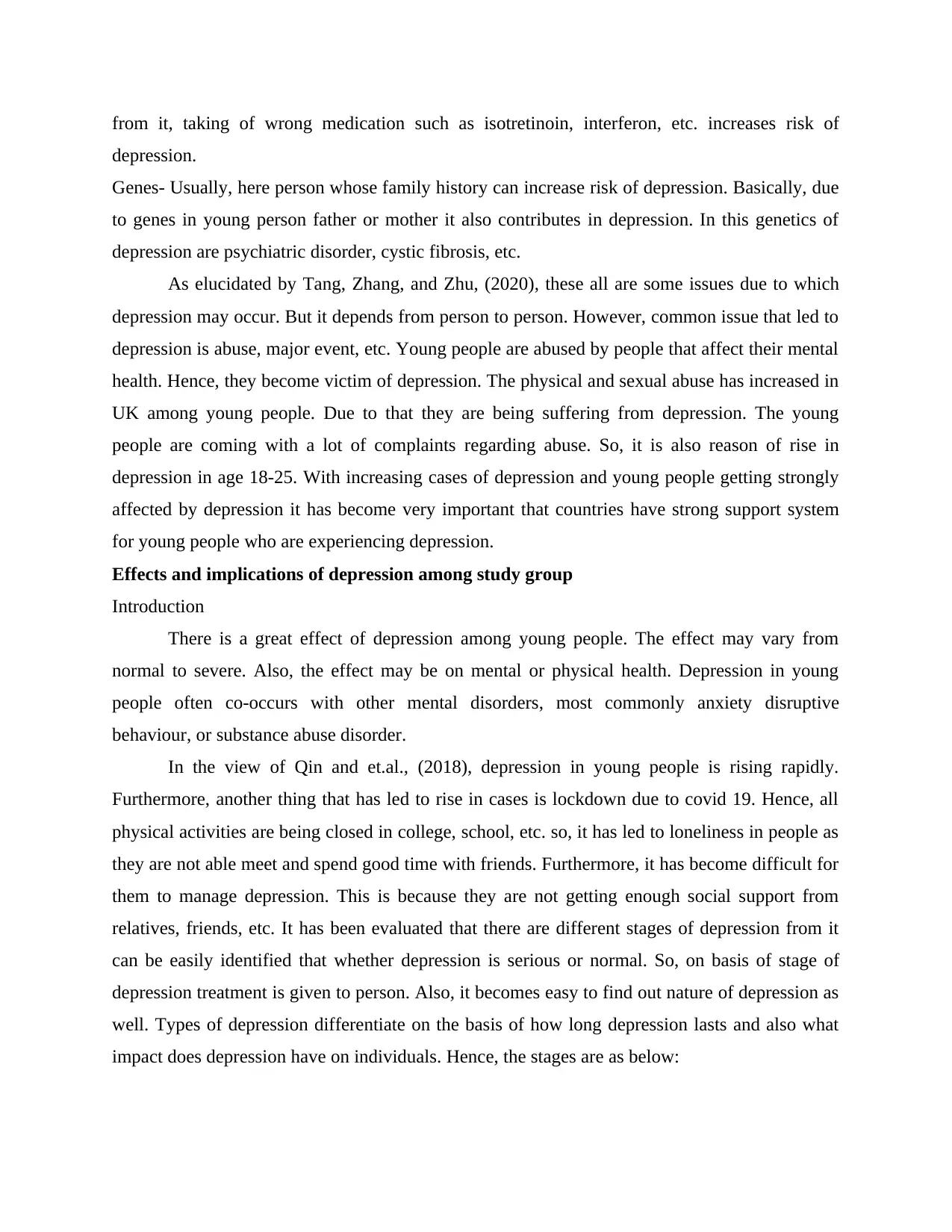
from it, taking of wrong medication such as isotretinoin, interferon, etc. increases risk of
depression.
Genes- Usually, here person whose family history can increase risk of depression. Basically, due
to genes in young person father or mother it also contributes in depression. In this genetics of
depression are psychiatric disorder, cystic fibrosis, etc.
As elucidated by Tang, Zhang, and Zhu, (2020), these all are some issues due to which
depression may occur. But it depends from person to person. However, common issue that led to
depression is abuse, major event, etc. Young people are abused by people that affect their mental
health. Hence, they become victim of depression. The physical and sexual abuse has increased in
UK among young people. Due to that they are being suffering from depression. The young
people are coming with a lot of complaints regarding abuse. So, it is also reason of rise in
depression in age 18-25. With increasing cases of depression and young people getting strongly
affected by depression it has become very important that countries have strong support system
for young people who are experiencing depression.
Effects and implications of depression among study group
Introduction
There is a great effect of depression among young people. The effect may vary from
normal to severe. Also, the effect may be on mental or physical health. Depression in young
people often co-occurs with other mental disorders, most commonly anxiety disruptive
behaviour, or substance abuse disorder.
In the view of Qin and et.al., (2018), depression in young people is rising rapidly.
Furthermore, another thing that has led to rise in cases is lockdown due to covid 19. Hence, all
physical activities are being closed in college, school, etc. so, it has led to loneliness in people as
they are not able meet and spend good time with friends. Furthermore, it has become difficult for
them to manage depression. This is because they are not getting enough social support from
relatives, friends, etc. It has been evaluated that there are different stages of depression from it
can be easily identified that whether depression is serious or normal. So, on basis of stage of
depression treatment is given to person. Also, it becomes easy to find out nature of depression as
well. Types of depression differentiate on the basis of how long depression lasts and also what
impact does depression have on individuals. Hence, the stages are as below:
depression.
Genes- Usually, here person whose family history can increase risk of depression. Basically, due
to genes in young person father or mother it also contributes in depression. In this genetics of
depression are psychiatric disorder, cystic fibrosis, etc.
As elucidated by Tang, Zhang, and Zhu, (2020), these all are some issues due to which
depression may occur. But it depends from person to person. However, common issue that led to
depression is abuse, major event, etc. Young people are abused by people that affect their mental
health. Hence, they become victim of depression. The physical and sexual abuse has increased in
UK among young people. Due to that they are being suffering from depression. The young
people are coming with a lot of complaints regarding abuse. So, it is also reason of rise in
depression in age 18-25. With increasing cases of depression and young people getting strongly
affected by depression it has become very important that countries have strong support system
for young people who are experiencing depression.
Effects and implications of depression among study group
Introduction
There is a great effect of depression among young people. The effect may vary from
normal to severe. Also, the effect may be on mental or physical health. Depression in young
people often co-occurs with other mental disorders, most commonly anxiety disruptive
behaviour, or substance abuse disorder.
In the view of Qin and et.al., (2018), depression in young people is rising rapidly.
Furthermore, another thing that has led to rise in cases is lockdown due to covid 19. Hence, all
physical activities are being closed in college, school, etc. so, it has led to loneliness in people as
they are not able meet and spend good time with friends. Furthermore, it has become difficult for
them to manage depression. This is because they are not getting enough social support from
relatives, friends, etc. It has been evaluated that there are different stages of depression from it
can be easily identified that whether depression is serious or normal. So, on basis of stage of
depression treatment is given to person. Also, it becomes easy to find out nature of depression as
well. Types of depression differentiate on the basis of how long depression lasts and also what
impact does depression have on individuals. Hence, the stages are as below:
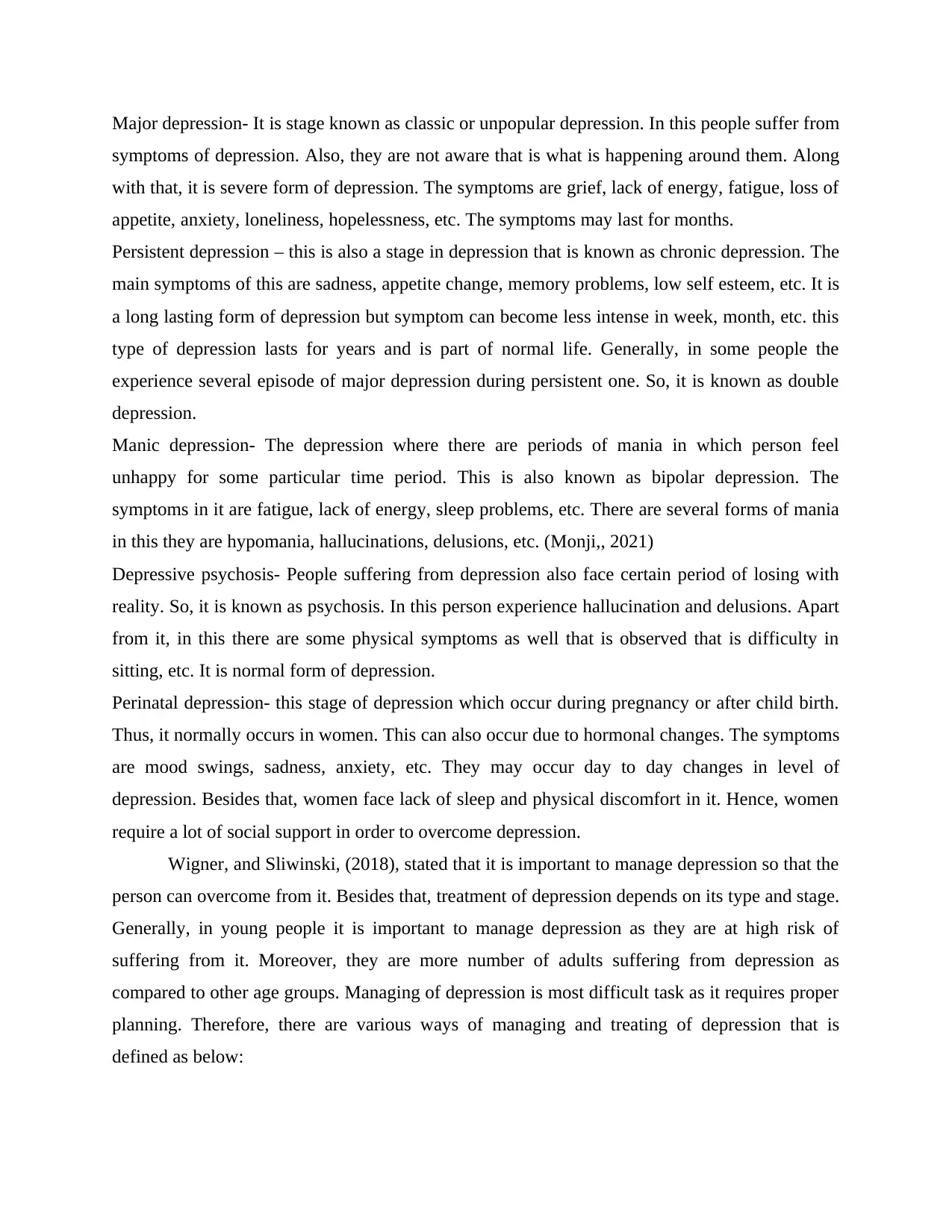
Major depression- It is stage known as classic or unpopular depression. In this people suffer from
symptoms of depression. Also, they are not aware that is what is happening around them. Along
with that, it is severe form of depression. The symptoms are grief, lack of energy, fatigue, loss of
appetite, anxiety, loneliness, hopelessness, etc. The symptoms may last for months.
Persistent depression – this is also a stage in depression that is known as chronic depression. The
main symptoms of this are sadness, appetite change, memory problems, low self esteem, etc. It is
a long lasting form of depression but symptom can become less intense in week, month, etc. this
type of depression lasts for years and is part of normal life. Generally, in some people the
experience several episode of major depression during persistent one. So, it is known as double
depression.
Manic depression- The depression where there are periods of mania in which person feel
unhappy for some particular time period. This is also known as bipolar depression. The
symptoms in it are fatigue, lack of energy, sleep problems, etc. There are several forms of mania
in this they are hypomania, hallucinations, delusions, etc. (Monji,, 2021)
Depressive psychosis- People suffering from depression also face certain period of losing with
reality. So, it is known as psychosis. In this person experience hallucination and delusions. Apart
from it, in this there are some physical symptoms as well that is observed that is difficulty in
sitting, etc. It is normal form of depression.
Perinatal depression- this stage of depression which occur during pregnancy or after child birth.
Thus, it normally occurs in women. This can also occur due to hormonal changes. The symptoms
are mood swings, sadness, anxiety, etc. They may occur day to day changes in level of
depression. Besides that, women face lack of sleep and physical discomfort in it. Hence, women
require a lot of social support in order to overcome depression.
Wigner, and Sliwinski, (2018), stated that it is important to manage depression so that the
person can overcome from it. Besides that, treatment of depression depends on its type and stage.
Generally, in young people it is important to manage depression as they are at high risk of
suffering from it. Moreover, they are more number of adults suffering from depression as
compared to other age groups. Managing of depression is most difficult task as it requires proper
planning. Therefore, there are various ways of managing and treating of depression that is
defined as below:
symptoms of depression. Also, they are not aware that is what is happening around them. Along
with that, it is severe form of depression. The symptoms are grief, lack of energy, fatigue, loss of
appetite, anxiety, loneliness, hopelessness, etc. The symptoms may last for months.
Persistent depression – this is also a stage in depression that is known as chronic depression. The
main symptoms of this are sadness, appetite change, memory problems, low self esteem, etc. It is
a long lasting form of depression but symptom can become less intense in week, month, etc. this
type of depression lasts for years and is part of normal life. Generally, in some people the
experience several episode of major depression during persistent one. So, it is known as double
depression.
Manic depression- The depression where there are periods of mania in which person feel
unhappy for some particular time period. This is also known as bipolar depression. The
symptoms in it are fatigue, lack of energy, sleep problems, etc. There are several forms of mania
in this they are hypomania, hallucinations, delusions, etc. (Monji,, 2021)
Depressive psychosis- People suffering from depression also face certain period of losing with
reality. So, it is known as psychosis. In this person experience hallucination and delusions. Apart
from it, in this there are some physical symptoms as well that is observed that is difficulty in
sitting, etc. It is normal form of depression.
Perinatal depression- this stage of depression which occur during pregnancy or after child birth.
Thus, it normally occurs in women. This can also occur due to hormonal changes. The symptoms
are mood swings, sadness, anxiety, etc. They may occur day to day changes in level of
depression. Besides that, women face lack of sleep and physical discomfort in it. Hence, women
require a lot of social support in order to overcome depression.
Wigner, and Sliwinski, (2018), stated that it is important to manage depression so that the
person can overcome from it. Besides that, treatment of depression depends on its type and stage.
Generally, in young people it is important to manage depression as they are at high risk of
suffering from it. Moreover, they are more number of adults suffering from depression as
compared to other age groups. Managing of depression is most difficult task as it requires proper
planning. Therefore, there are various ways of managing and treating of depression that is
defined as below:
⊘ This is a preview!⊘
Do you want full access?
Subscribe today to unlock all pages.

Trusted by 1+ million students worldwide
1 out of 30
Related Documents
Your All-in-One AI-Powered Toolkit for Academic Success.
+13062052269
info@desklib.com
Available 24*7 on WhatsApp / Email
![[object Object]](/_next/static/media/star-bottom.7253800d.svg)
Unlock your academic potential
Copyright © 2020–2026 A2Z Services. All Rights Reserved. Developed and managed by ZUCOL.





